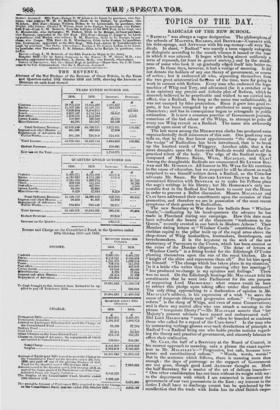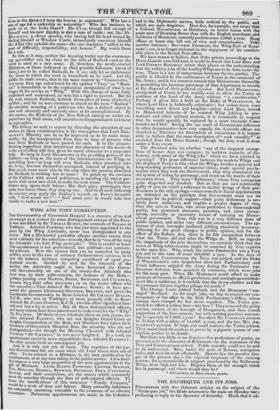TOPICS OF THE DAY.
RADICALS OF THE NEW SCHOOL.
" Ranrcar." was always a vague designation. The philosophers of
the schools of MALTHUS, RICARDO, and BENTHAM-COBEETT *With, his debt-sponge, and ATTWOOD with his rag-money--all. were 'Ra- dicals. In short, " Radical" was merely a term vaguely eulOgistlp or dislogistic according to the mouth whence it issued or the :tope in which it was uttered. It began with being almost uniformly .a term of reproach, (at least in genteel society,) and by the sturdi-, ness of some who took it up gradually edged itself into better rep; pute. In those days, however, it had a vestige of meaning. It did, not denote the holders of any one theory of government, or course. of action ; but it embraced all who, separating themselves from the two great aristocratical factions of the time, were for going to • work in earnest with Reform. Every man who eschewed the logo. machies of' Whig and Tory, and advocated (be it a crotchet or be it an opinion) any precise and definite plan of Reform, which he sincerely believed to be practicable and wished to see carried into effect, was a Radical. So long as the name was unfashionable, it was not usurped by false pretenders. Since it grew into good re- pute, it has been arrogated by or attributed to many suspicious characters ; and has in consequence begun to retrograde in public estimation. It is now a common practice of Government journal; conscious of the bad odour of the 'Whigs, to attempt to palm off every raw W hg recruit as a Radical. The name sits awkwardly enough upon most of them. The last move among the MELBOURNE clerks has produced some unprecedentedly droll misnomers of this sort. One good easy man tells us, that by the four latest appointments " the sharp end of the wedge" of Radicalism has been introduced, that is to break up the knotted trunk of Whiggery. Another adds, that a few more draughts upon the front-rank Radicals would absorb all the practical talent of the body. The edge of the Radical wedge is composed of Messrs. SHED:, WYSE, MACAULAY, and CLAY! Among the draughtable Radicals are enumerated Sir LYTTON Bur, WEE and Mr. HORSEMAN. All honour to Mr. WYSE for his exertions in the cause of education, but we suspect he will be almost as much surprised to see himself Nvritten down a Radical, as the Corn-law advocate Mr. SHED.. Sir EDWARD LYTTON BULWER has SO ffIr committed flirtation with 13K:tal1As' as to make his Pelham place the sage's writings in his library; but Mr. HottsimaN's only me- morable feat in the Radical line has been to count out the house in order to prevent a Ballot discussion. Messrs. MACAULAY an • CLAY have addressed their constituents upon the occasion of their , promotion, and therefore we are in possession of the most recent symptoms of their growth in Radicalism. The new Secretary at War dates his bulletin front "Windsor Castle,"-indicating by his head-quarters the advance he has made in Placeland during one campaign. How this date must have refreshed the hearts of the threescore "tradesmen to the Queen," recently created in one batch in Modern Athens ! Their Member dating letters at "Windsor Castle" constitutes the Co. rinthian capital to the pillar built up of the royal arms above the shop-doors of Whig booksellers, bootmakers, linendrapers, and breechesmakers. It is the keystone to the arch of the new aristocracy of Purveyors to the Crown, which has been erected on the ruins of the Dundas Oligarchy. The dater of letters at "Windsor Castle" is a fitting leader for the Edinburgh 0"1 (toles , pluming themselves upon the run of the royal kitchen. He is "knight of the shire and represents them all." But let him speak. , for himself. "The change which has taken place in my situation," [is it a bride who writes thus the morning after her marriage ?j "has produced no change in my opinions and feelings." There, was no need. On the Edinburgh hustings Mr. MACAULAY told his constituents that he went into Parliament for the one purpose of supporting Lord Mer.nouartst: what reason could lie have: to retract this pledge upon taking office under that noblemen? The only thing approaching to a declaration of opinion in Mr. MACAULAY'S address, is his expression of a wish "to serve the cause of temperate liberty and progressive reform." "Progressive reform" is the slang of Whigs, and even of some Conservatives; - and is there any mortal alive who can attach a meaning to the phrase " temperate liberty ?"-Mr. MACAULAY asserts that "her : Majesty's present advisers have meant and endeavoured well."' Did Lord Mer.notatwe "mean well" when he branded as madmen those who called for a repeal of' the Corn-laws ? Is the man who by unmeanina3 verbiage glosses over such derelictions of principle a . Radical ?-a Radical being one who holds precise notions regard- ing the theory and practice of government, and sincerely labours to effect their realization.
Mr. CLAY, the half of a Secretary at the Board of Control, in' his nearest approach to meaning, uses a phrase the exact equiva- lent to Mr. MACAULAY'S-" Progressive, but safe, because tem- perate and constitutional reform." "Words, words, words!" But in the sentence which follows, there is meaning more than enough : the days of patronage as the support of Government are not gone, though good lord Alamos', thought so. Mark the half Secretary for a master of the art of delicate inuendo- " One other consideration has not been without its weight with me: to the department with which I ant connected is intrusted the governnient of our vast possessions in the East : my interest in the duties I shall have to discharge cannot but be quickened, by the recollection that the trade with India has its chief British map°.
shim in the disteict I hat:e the 'honour t,o represent", , Who has a
son of age foil a cadetship Or ? Who has business to push on at the India Board? Mr. CLAY, though full enough of himself and his now dignity; ifs also a man of trade : not, like Mr. blsesimar, a clever spouter, who having had his head, turned by Wing himself at Windsor Castle, immediately conceives himself the Atlas Who Upholds the state—the one champion "called to the post of difficulty, responsibility, and honour.' Big words these
for a sub. •
Be this as it may, neither the knowing trader nor the overween- ing speechifier can lay claim to the title of Radical—unless the word is used in a new sense. If, therefore, the newly-created Ministers, or those indicated as their possible followers, (most of them) are to be called Radicals, be it so ; only let us understand the sense in which the word is henceforth to be used. Let the public be made aware, that in the same manner as "Conservative" was' some time ago substituted for the epithet "Tory," so "Radi- cal" is henceforth to be the euphonious designation of what is no longer fit for service as "Whig." With this change of name fairly explained and understood, no man has a right to quarrel. But let the real, earnest Radicals, bethink themselves of some distinctive epithet ; and let no man continue to attach to the term "Radical" the obsolete meaning of a politician who has a defined object in view and sincerely and earnestly aims at its accomplishment. By this means, the Radicals of the New School, raising no undue ex- pectations by their name, will occasion no disappointment and incur no reproaches. The fallacy we seek to expose by directing the attention of our readers to these considerations, is the assumption that Lord MEL- Boraxes Ministry can be so far improved as to be made trust- worthy, by the incorporation from time to time of persons who have been Radicals or have passed for such. It is the prepon- derating ingredient that determines the character of the mass—it is the eontiolling will that gives its moral character to a corporate body. So long as Lord MELBOURNE is the presiding genius of the Cabinet—so long as the mass of the Administration are Whigs or something less—so long will even Radicals, when absorbed into the body, become themselves corrupted, instead of purifying it. How. Much more must this be the case when the persons absorbed are Radicals in nothing but in name ! To patch up the crevices of the Cabinet with sound politicians, is mending old rotten gar- ments with stout new cloth, to make the rent worse. The Cabinet- tinkers may spare their labour : like their gipsy prototypes, they make two holes 'where they stop up one. And to all such tinkering the 'country may apply the linkboy's remark on POPH'S favourite oath, " God mend me "—" God mend you! it would take less trouble to make a new man !"



























 Previous page
Previous page